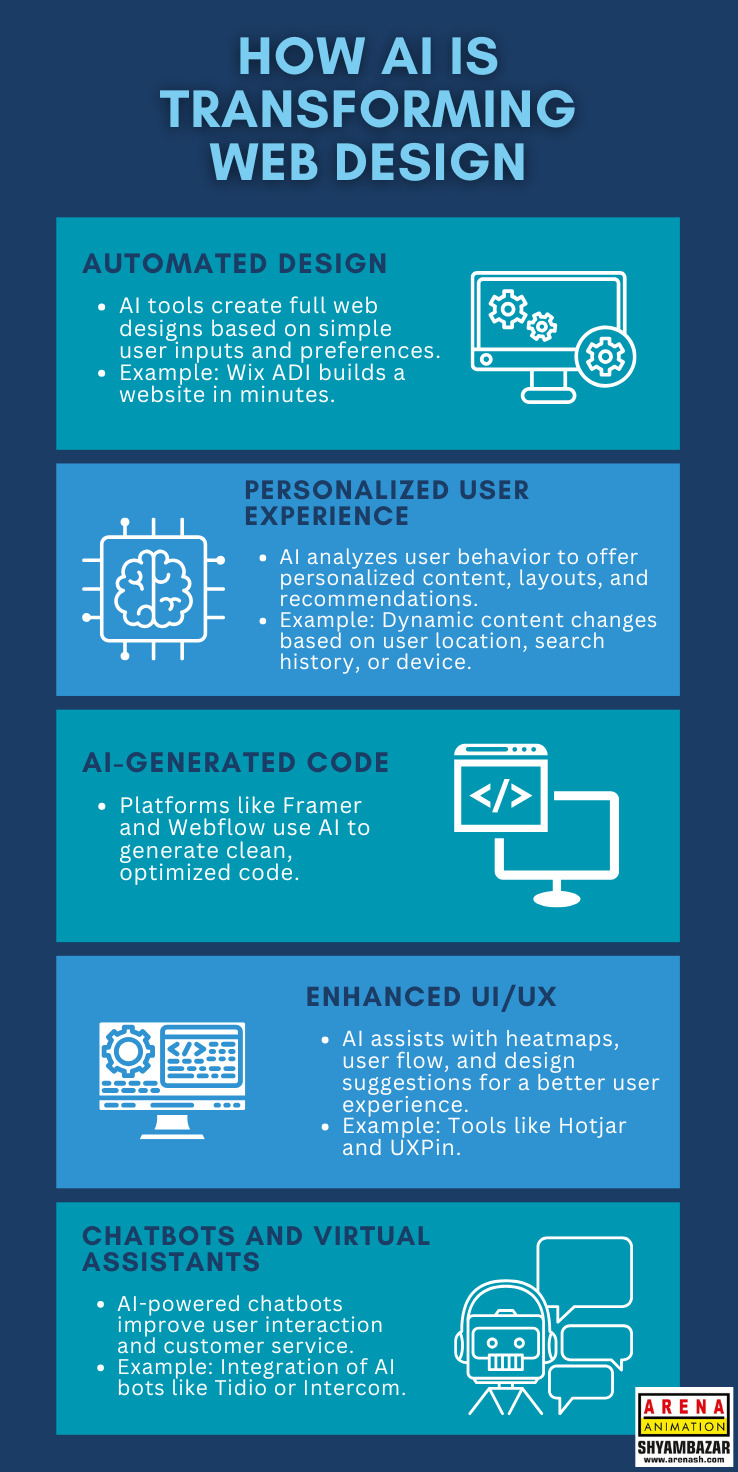#Web Development Institute fees
Explore tagged Tumblr posts
Text
Looking for the best institute for a web development course in Kolkata? Our comprehensive training program covers HTML, CSS, JavaScript, React, PHP, MySQL, and more, ensuring you gain hands-on experience in front-end and back-end development. Learn from industry experts with real-world projects and become job-ready. As the best web development training institute in Kolkata, we provide expert mentorship, flexible class schedules, and 100% placement assistance. Whether you're a student, job seeker, or entrepreneur, our course is designed to help you build a successful career in web development. Enroll today and start your journey toward becoming a skilled web developer!
#web development course kolkata#best institute for web development course in kolkata#best web development institute in kolkata#best web development training institute in kolkata#web design and development course in kolkata#web design training institute in kolkata#web developer course in kolkata#web development course fees in kolkata#web development training institute in kolkata#best web development institute in kolkata with placement
0 notes
Text

How AI is Transforming Web Design
Whether you're a beginner or a professional, understanding AI in web design can give you a competitive edge. If you’re looking to master the latest web design trends, enrolling in a web design course in Kolkata can equip you with the skills to harness AI for modern, user-centric website creation.
Visit: https://www.arenash.com/web-design-courses-kolkata/
#web design course fees in kolkata#web design institute in kolkata#web design course in kolkata#web development
0 notes
Text

Web Designing Training Institute in Noida | Drona Tech
Turn your web design dreams into reality at Drona Tech Academy! Join our Web Designing course in Noida and craft eye-catching websites that stand out. Enroll at Drona Tech Academy for the best Digital Marketing course in Noida. Master SEO, PPC, and social media skills from industry experts. Join now Turn your web design dreams into reality at Drona Tech Academy! Join our Web Designing course in Noida and craft eye-catching websites that stand out.
#web development training institute in noida#web development training in noida#web development course fees
0 notes
Text
Web Development Classes in Delhi by Jeetech Academy
Discover the gateway to the digital world through specialized web development classes in Delhi.
#Web development classes in delhi#web development classes#web development course in delhi#web development institute in delhi#web development course#web development course fees in delhi
0 notes
Text
#autocad course fees chandigarh#best autocad institute near me#industrial#skysysengineering#web development
0 notes
Text
Web development Training Institute in Gurgaon
The Best Web development training who can build both front-end and back-end. The languages used for front-end development are HTML, CSS, JavaScript Etc. Each language has its strengths and weakness. website Back-end languages are PHP, JAVA, PYTHON, and Ruby the most popular back-end languages.
#Web designing Training Course in Gurgaon#web designing course near me#Web Development Training Institute in Gurgaon#ducat web development course fees#web development course fees and duration#full stack developer course duration and fees
0 notes
Text
#Digital marketing certification course#Digital marketing institute in Nagpur#Web design training institute in Nagpur#Web designing course in Nagpur#Web development course in Nagpur#Website designing classes in Nagpur#Website desing classes fees#Website development training institute in Nagpur
0 notes
Text
#Full Stack Web Developer Course in Hyderabad#Full Stack Course in Hyderabad#Full Stack Training Institute in Hyderabad#Full Stack Course fee in Hyderabad#Full Stack Course with live projects
1 note
·
View note
Text
#web development course fees#Web Development Training in Noida#Web Development Training Institute in Noida#Web Development course in Noida
0 notes
Text

Tecswan Institute is a dynamic and innovative institution dedicated to empowering students with practical, hands-on experience in the latest technologies . Digital marketing courses in kochi , latest technology and software development institutions , Best IT and research centre in kochi , digital marketing course fees in kerala , free web designing course by google , Career in digital marketing , quality training digital marketing ,opportunities in dm ,best dm in kochi , best dm agency , best marketing agencies , web development courses in kochi ,best designing courses ,online digital marketing courses ,best online web development course , short time digital marketing course
#Digital marketing courses in kochi#latest technology and software development institutions#Best IT and research centre in kochi#digital marketing course fees in kerala#free web designing course by google#Career in digital marketing#quality training digital marketing#opportunities in dm#best dm in kochi#best dm agency#best marketing agencies#web development courses in kochi#best designing courses#online digital marketing courses#best online web development course#short time digital marketing course
1 note
·
View note
Text

Best Web Design Institute in Kolkata - Learn, Create, Succeed
Unlock your creativity with expert-led courses at the leading web design institute in Kolkata. Master UI/UX, responsive design, and cutting-edge tools to build stunning websites. Join a comprehensive curriculum tailored for beginners and professionals alike. Launch your career with hands-on projects and industry-relevant skills. Enroll today and shape your digital future!
Visit: https://www.arenash.com/web-design-courses-kolkata/
#web design course fees in kolkata#web development#web design course in kolkata#web design institute in kolkata
0 notes
Text
Fullstack .Net Free Workshop
Quality Thought, a leading software training institute with a strong reputation for delivering industry-ready IT education, is excited to offer a Free Workshop on Fullstack .NET Development on 12-July-2025. This workshop is an excellent opportunity for students, fresh graduates, job seekers, and working professionals to dive deep into one of the most in-demand technology stacks – the Microsoft .NET ecosystem.
This hands-on workshop is designed to introduce participants to the complete lifecycle of fullstack development using .NET technologies. From building dynamic backend systems to creating interactive frontend interfaces, attendees will gain exposure to modern web development practices and tools. The workshop also includes a Participation Certificate, adding value to your resume and professional profile.
What You’ll Learn:
ASP.NET Core: Understand how to build high-performance, cross-platform web applications using ASP.NET Core. Learn the basics of MVC architecture, routing, middleware, and authentication techniques to develop robust backend systems.
Entity Framework Core: Discover the power of Entity Framework Core, Microsoft’s modern ORM tool. Learn how to connect applications to databases, perform CRUD operations, and use LINQ queries efficiently through code-first and database-first approaches.
Blazor: Explore Blazor, a revolutionary framework that lets you build interactive web UIs using C#. Whether it's Blazor Server or Blazor WebAssembly, you’ll learn how to create single-page applications (SPAs) without relying heavily on JavaScript.
RESTful APIs: Learn to design and develop RESTful APIs using ASP.NET Core Web API. Gain practical knowledge of creating endpoints, handling HTTP requests, and integrating APIs with frontend applications securely and efficiently.
Frontend Frameworks: Get introduced to popular frontend frameworks and how they work with .NET backends. This includes working with tools like Angular, React, or Blazor to build responsive and dynamic user interfaces.
Why Attend?
Free of Cost: Gain top-quality training without any fees.
Certificate of Participation: Receive a certificate to enhance your LinkedIn profile and resume.
Practical Learning: Hands-on sessions, real-world projects, and code walkthroughs.
Expert Guidance: Learn from experienced trainers with deep industry knowledge.
Career-Oriented Content: Tailored to meet the demands of current software development job roles.
Whether you're new to programming or looking to upgrade your skills, this workshop offers the perfect starting point to explore the world of fullstack .NET development. Don’t miss this chance to learn, code, and grow with Quality Thought. Register today and take the first step toward a successful career in software development!

#workshop#Education#Fullstack .Net#Free Workshop#Certification#Quality Thought#.Net Training#.Net Course
2 notes
·
View notes
Text
Web Development Training Institute in Noida - Drona Tech Academy
Drona Tech Academy provides one of the best Web Development Training Institute in Noida. Elevate your digital marketing skills with our specialized training courses. Join us and become a certified digital marketing professional.
#Web Development course in Noida#Web Development Training Institute in Noida#Web Development Training in Noida#web development course fees
0 notes
Text
Become a 2D Animation Expert with Pickles Animations
Why Choose 2D Animation as a Career?
In today’s fast-paced digital world, 2D animation continues to be a powerful medium for storytelling in films, advertisements, web content, and educational tools. It’s widely used by leading production houses, marketing firms, gaming studios, and e-learning platforms.
By enrolling in a 2D animation course, you’ll gain the skills to create dynamic characters, immersive storyboards, and visually appealing animations. The demand for professional 2D animators is growing rapidly—and this is your chance to be a part of the creative revolution.
About Pickles Animation – Best 2D Animation Institute in Delhi
At Pickles Animation, we offer a hands-on, industry-oriented 2D Animation Course in Delhi that prepares you for real-world opportunities. Our expert instructors have years of experience in the animation industry and focus on developing both the technical and creative aspects of animation.
What You’ll Learn:
Fundamentals of classical 2D animation
Character design and rigging
Storyboarding and concept development
Digital animation techniques using industry-standard software
Project-based learning to build your animation portfolio
Whether you’re a student, a creative professional, or someone looking to switch careers, our 2D animation course is designed to help you build a strong foundation and master the tools of the trade.
Course Highlights:
Beginner to advanced-level modules
One-on-one mentorship and live project experience
Affordable fees and flexible batches
100% placement assistance
State-of-the-art labs and software
Join the Best 2D Animation Course in Delhi Today!
Make the first move towards your dream career in animation. Join the community of passionate artists and creators at Pickles Animation.
��� Call Now: 9999065344 🌐 Visit Us: https://www.picklesanimation.com/2d-animation-course/in-delhi/
2 notes
·
View notes
Text
ADCA (Advanced Diploma in Computer Applications) Full Form, Eligibility, Duration, Syllabus, Scope
What is ADCA? ADCA full form is Advanced Diploma in Computer Applications. ADCA is a comprehensive diploma program designed to provide foundational and intermediate knowledge of computer applications. It typically covers areas such as:
Office productivity software (MS Word, Excel, PowerPoint)
Basic programming (often C, C++, or Python)
Database management
Accounting software (like Tally with GST)
Web design basics (HTML/CSS)
Internet and email use
Basic graphics and multimedia tools
The course usually spans 12 months, is divided into two semesters, and is available through various private institutes, training centers, and some state-affiliated education boards across India. ADCA course fee ranges between Rs. 10,000 to Rs. 15,000, depending on the institution’s quality and location.

Who Should Take This Course?
ADCA is ideal for:
Students (10th/12th pass) seeking a professional skill to enhance employability
Job seekers aiming for entry-level roles in IT support, data entry, or office administration
Small business owners want to manage their accounting, design, or office tasks.
Working professionals looking to upskill in computer usage and basic programming.
Beginners in IT who want a low-cost and practical entry point into the digital workforce
What is the use of ADCA?
In an era dominated by digital transformation, ADCA holds increasing relevance:
Digital Literacy: It builds foundational digital skills critical for nearly every job today.
Improves Workplace Efficiency
Learning office tools like MS Word, Excel, and email helps you work faster and smarter. These skills are helpful in many jobs—especially in schools, offices, shops, and banks—where digital work is a daily routine.
Boosts Employability
Today, most jobs—even non-technical ones—require basic computer knowledge. ADCA gives you the skills employers expect, like using a computer, typing, handling data, and doing simple digital tasks.
Helps Small Business Owners and Entrepreneurs
If you run a shop or business, ADCA helps you manage accounts, create invoices, design flyers, and even make a simple website. It gives you the digital tools to grow your business and save money by doing tasks yourself.
Bridging the Skill Gap: Helps youth in semi-urban and rural areas gain access to IT careers without needing a full degree.
Course Duration & Eligibility
Duration: 12 Months (Typically 2 Semesters)
Eligibility: 10th / 12th pass or equivalent
ADCA Computer Course Syllabus
1. Fundamentals of Computer
Introduction to Computers
Computer Architecture
Computer Peripherals
Computer Hardware and Software
2. Operating Systems (OS)
Windows
Linux/Unix
DOS
3. Programming Languages
C
C++
Java
Python
4. Web Technologies
HTML, CSS, and JavaScript
Web Development Tools
Server-side Scripting (PHP, ASP.NET, Node.js)
Database Connectivity (MySQL, SQL Server)
5. Database Management System (DBMS)
Introduction to DBMS
SQL and Database Design
Data Security and Integrity
6. Software Engineering
Software Development Life Cycle (SDLC)
Software Testing
Project Management
7. Networking Concepts
Basics of Networking
TCP/IP Protocol Suite
Network Security
8. Mobile App Development
Introduction to Mobile App Development
Android Development
iOS Development
9. Data Structures and Algorithms
Basic Data Structures (Arrays, Linked Lists, Trees)
Algorithm Design and Analysis
10. Cyber Security
Introduction to Cybersecurity
Security Threats and Countermeasures
11. Soft Skills and Communication
Effective Communication
Presentation Skills
Teamwork and Leadership
12. Project Work
Practical Application of Knowledge Acquired Throughout the Course
ADCA Course Module & Topics Covered:
The Detail for an Advanced Diploma in Computer Applications (ADCA) course includes topics such as: ModuleTopics CoveredFundamentals of ComputersBasic concepts, architecture, and peripheralsOperating SystemsWindows, Linux, and DOSProgramming LanguagesC, C++, Java, PythonWeb TechnologiesHTML, CSS, JavaScript, PHP, SQLDatabase ManagementSQL, database design, and securitySoftware EngineeringSDLC, testing, project managementNetworkingBasics of networking, TCP/IP, and network securityMobile App DevelopmentAndroid/iOS development basicsData Structures & AlgorithmsArrays, linked lists, trees, algorithmsCyber SecurityIntroduction to threats and countermeasuresSoft SkillsCommunication, presentation, teamworkProject WorkPractical applications
Why Choose ADCA?
The Advanced Diploma in Computer Application (ADCA) opens up numerous opportunities in the ever-growing field of IT. Here is a look at the scope and career prospects for individuals who complete this course:
Scope of ADCA
Wide Range of Skills: The ADCA course teaches students useful computer skills like using software, basic programming, managing data, building websites, and understanding online safety. These skills help students work in many different jobs.
High Job Demand: As more businesses use technology, the need for trained computer professionals is growing. ADCA graduates can find jobs in software, IT services, schools, banks, hospitals, and more.
Foundation for Advanced Studies: The ADCA course lays a solid foundation for further studies in IT. Graduates can pursue advanced diplomas and undergraduate and postgraduate degrees in computer science, information technology, and related fields.
Career Prospects
ADCA graduates have a wide range of career options available to them. Some of the common job roles include:
Software Developer: Develop and maintain software applications using programming languages learned during the course, such as C, C++, Java, and Python.
Web Developer: Design and develop websites and web applications using HTML, CSS, JavaScript, and server-side scripting languages.
Database Administrator: Manage and maintain databases, ensuring data security, integrity, and efficient performance.
IT Support Specialist: Provide technical support and troubleshooting assistance for computer systems, software, and networks.
Network Administrator: Oversee and manage an organization’s computer networks, ensuring smooth and secure operations.
Cybersecurity Analyst: Protect an organization’s computer systems and networks from cyber threats by implementing security measures and monitoring for vulnerabilities.
Mobile App Developer: Create and maintain mobile applications for Android and iOS platforms.
Project Manager: Manage IT projects, ensuring they are completed on time, within budget, and meet the desired quality standards.
Data Analyst: Analyze and interpret data to help organizations make informed decisions.
Educator/Trainer: Teach computer applications and IT courses in schools, colleges, or training centers.
Which is Better DCA or ADCA?
Course Level
Entry-Level Course: DCA is perfect for beginners who want to learn basic computer skills. It covers essential tools for office work, including MS Office, internet usage, and typing.
What You will Learn:
MS Word, Excel, PowerPoint
Internet basics & email
Typing and computer fundamentals
ADCA (Advanced Diploma in Computer Applications)
Intermediate-Level Course: ADCA builds on what you learned in DCA. It offers more in-depth training in IT skills, making it ideal for those wanting to enhance their programming, web design, and accounting knowledge.
What You will Learn:
Advanced MS Office
Programming basics (C/C++)
Web design (HTML, CSS)
Database management and Tally with GST
Syllabus: Includes everything from DCA plus programming (C/C++), web design (HTML/CSS), database management (MySQL), accounting software (Tally), and graphic design (Photoshop).
2. Course Duration
DCA:
Typically, it lasts 6 months (may vary depending on the institute or location).
ADCA:
Generally spans 12 months, divided into two semesters, offering more detailed training over a more extended period.
3. Eligibility
DCA:
Open to anyone with a 10th-grade pass or equivalent. It is ideal for individuals with minimal or no prior computer knowledge.
ADCA:
Typically requires a 10th/12th pass or a completed DCA. ADCA is more suitable for students who have a basic understanding of computers and wish to learn more advanced skills.
4. Skills Acquired
DCA:
Basic computer skills such as:
Microsoft Office (Word, Excel, PowerPoint)
Internet usage, email management
Typing skills
ADCA:
In addition to DCA skills, ADCA covers:
Programming (C/C++ or Python)
Web Design (HTML, CSS)
Database management (MySQL)
Tally with GST (Accounting Software)
Basic graphic design tools like Photoshop
Project work and real-world applications
5. Career Opportunities
DCA:
Ideal for entry-level roles like:
Data Entry Operator
Office Assistant
Computer Operator
Basic technical support
ADCA:
Opens up higher-level job opportunities, including:
Junior Programmer
Web Designer
Accounting Clerk (with Tally skills)
Junior Database Administrator
Graphic Designer (basic)
IT Support Specialist
6. Salary Expectations
DCA:
Entry-level salaries for DCA graduates typically range from ?8,000 to ?15,000 per month, depending on the job role and location.
ADCA:
Graduates of ADCA can expect higher starting salaries, generally ranging from ?15,000 to ?25,000+ per month, depending on the specialization (e.g., programming, web design).
7. Which One is Better?
DCA is suitable for:
Individuals who are new to computers
People looking for entry-level office jobs
Those on a limited budget and time
ADCA is suitable for:
People looking to specialize in IT and office-related work
Those interested in roles requiring programming, web design, or accounting skills
Individuals aiming for a broader skill set and higher-paying jobs
1 note
·
View note
Text
Artificial Intelligence: Transforming the Future of Technology

Introduction: Artificial intelligence (AI) has become increasingly prominent in our everyday lives, revolutionizing the way we interact with technology. From virtual assistants like Siri and Alexa to predictive algorithms used in healthcare and finance, AI is shaping the future of innovation and automation.
Understanding Artificial Intelligence
Artificial intelligence (AI) involves creating computer systems capable of performing tasks that usually require human intelligence, including visual perception, speech recognition, decision-making, and language translation. By utilizing algorithms and machine learning, AI can analyze vast amounts of data and identify patterns to make autonomous decisions.
Applications of Artificial Intelligence
Healthcare: AI is being used to streamline medical processes, diagnose diseases, and personalize patient care.
Finance: Banks and financial institutions are leveraging AI for fraud detection, risk management, and investment strategies.
Retail: AI-powered chatbots and recommendation engines are enhancing customer shopping experiences.
Automotive: Self-driving cars are a prime example of AI technology revolutionizing transportation.
How Artificial Intelligence Works
AI systems are designed to mimic human intelligence by processing large datasets, learning from patterns, and adapting to new information. Machine learning algorithms and neural networks enable AI to continuously improve its performance and make more accurate predictions over time.
Advantages of Artificial Intelligence
Efficiency: AI can automate repetitive tasks, saving time and increasing productivity.
Precision: AI algorithms can analyze data with precision, leading to more accurate predictions and insights.
Personalization: AI can tailor recommendations and services to individual preferences, enhancing the customer experience.
Challenges and Limitations
Ethical Concerns: The use of AI raises ethical questions around data privacy, algorithm bias, and job displacement.
Security Risks: As AI becomes more integrated into critical systems, the risk of cyber attacks and data breaches increases.
Regulatory Compliance: Organizations must adhere to strict regulations and guidelines when implementing AI solutions to ensure transparency and accountability.
Conclusion: As artificial intelligence continues to evolve and expand its capabilities, it is essential for businesses and individuals to adapt to this technological shift. By leveraging AI's potential for innovation and efficiency, we can unlock new possibilities and drive progress in various industries. Embracing artificial intelligence is not just about staying competitive; it is about shaping a future where intelligent machines work hand in hand with humans to create a smarter and more connected world.
Syntax Minds is a training institute located in the Hyderabad. The institute provides various technical courses, typically focusing on software development, web design, and digital marketing. Their curriculum often includes subjects like Java, Python, Full Stack Development, Data Science, Machine Learning, Angular JS , React JS and other tech-related fields.
For the most accurate and up-to-date information, I recommend checking their official website or contacting them directly for details on courses, fees, batch timings, and admission procedures.
If you'd like help with more specific queries about their offerings or services, feel free to ask!
2 notes
·
View notes